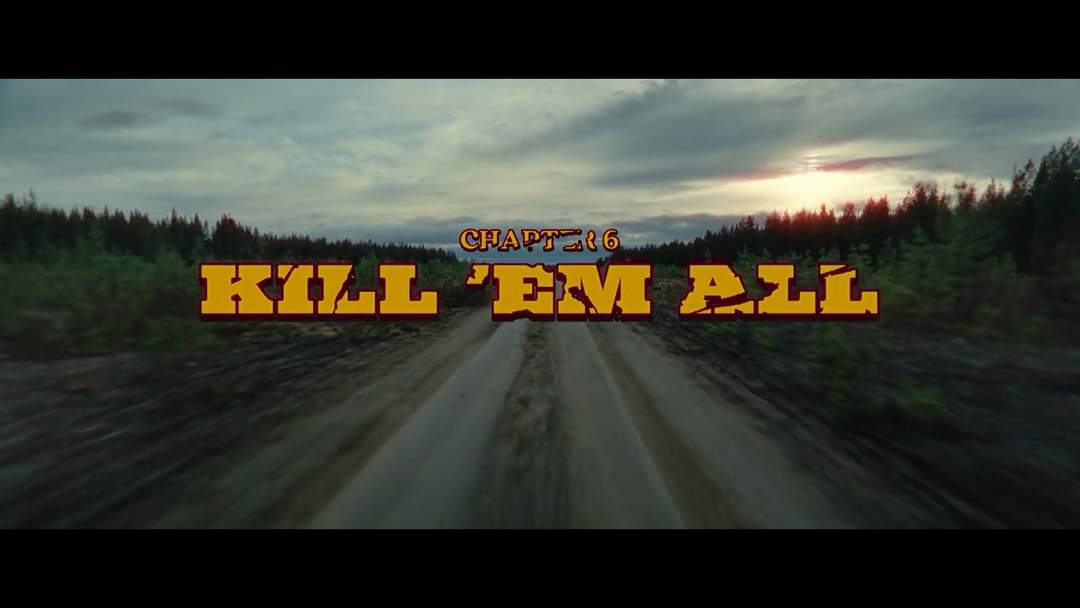Sisu, the Finnish World War II action movie that just arrived on demand after a brief stint in theaters, is fucking ludicrous. The plot is a 9,000th rehash of First Blood, in which a gang of bad guys decides to fuck with the wrong man. The hero (Jorma Tommila) is a former unstoppable killing machine who’s just trying to live in peace before the aforementioned bad guys bring out the dawg in him one last time. There’s even an obligatory scene in Sisu where the bad guys (Nazis, in this case) are told that the seemingly harmless fella they’re targeting is, in fact, a one-man death squad, and that they’re lucky to still be alive after having crossed him.
Do the bad guys listen to this grave warning? Reader, they do not.
No, they still keep fucking with our hero, and to no good end. They fire a zillion bullets at him, but always aim at his footprints. The few times they DO successfully shoot him, he lives. They hang him, and he lives. They beat him repeatedly with a hook, and he lives. They leave him inside a nosediving airplane without a parachute, and he lives. Our hero lives and lives and lives, methodically killing all of the bad guys while doing so. He kills the Nazis with a knife that effortlessly slides through human bone. He kills them with a thrown landmine. He kills them by slitting their throats underwater and then using their lungs as ad hoc scuba gear. All of it is straight out of the '80s Schwarzenegger canon, and not a second of it is believable.
And THAT is why Sisu is a fucking masterpiece.
When John Wick came out in 2014, it was similarly lauded for leaning heavily on hoary but beloved action-movie tropes (and brilliant stuntwork; that was pretty important). No one will mistake John Wick for, you know, reality. But that’s what made it so good. Like Sisu, the people behind John Wick weren’t afraid to exploit the fact that movies aren’t real. They’re pretend, even if that’s easy to forget in a blockbuster universe containing multiple, concurrent method-acting Jokers and mawkish attempts at tackling Real Themes juxtaposed against ten-cent CGI backdrops.
I’m as bad as any other fanboy when it comes to this shit. Why did I love Andor? Because its characters and their problems all felt REAL. Why do I watch Succession? Well, because it holds up a jaundiced mirror to our real-world power structure. Why did I always hate musicals? Because bro real people just don’t break out into song like that, bro. Why did I watch all of those post-Joel Schumacher Batman movies and like them? Because what Bruce Wayne went through is just, like, so real man. TOO real. I, a non-billionaire whose parents are still very much alive, can relate.
In an odd way, it’s only natural to demand reality from your fiction. After all, you and I are forced to deal with fake shit every second of every day—fake news; parody Twitter accounts; fake Instagram feuds that turn out to be brand stunts; an endless number of people online who reside in that obnoxious space between joking and not joking; the threat of AI making everything fake in the coming years. Spend every day with all this fakeness smothering you and soon you rely on TV and movies, counterintuitively, to be your ONLY source of realness in this world—a refuge of authentic feeling in a world choking on artificiality.
But movies and TV were never meant to be like that, or just that. Art is a visual representation of the human imagination, and it’s silly to restrict that imagination to the "believable." That’s why, whenever I see a movie like Sisu, I’m reminded Oh yeah, none of this has to be real. Everything can be fucking insane if you want it to. Laws of science don’t have to be obeyed. Actors don’t have to tear their own guts out for every role. Titles on screen don’t exclusively have to be in austere fonts. In fact, they can look like this:

This is the gift of movies. It’s why I loved Sisu. It’s also why I went from finding Wes Anderson too twee to realizing that he might just be my favorite director going right now. Once upon a time, I wanted Anderson to make a “normal” movie, instead of his usual dollhouse fare. But why did I want that man’s films, which look like nothing else out there, to look like everyone else’s films? I shouldn’t have, and ultimately did not. A "realistic" Wes Anderson movie is as point-missing as a Disney live-action remake. I now want Wes Anderson to stay exactly the way he is now: constructing fanciful little yarns that bear only slight resemblance to the world outside of your local cineplex.
Nothing Anderson does even bothers to look real. I remember a moment in The French Dispatch where Anderson flashes forward by having a young Moses Rosenthaler (played by Tony Revolori) get up and walk out of the frame, with an older Moses Rosenthaler (played by Benicio Del Toro) coming into the frame to take his place. It was a simple trick, one that Anderson used because he was confident that his audience would understand the transition taking place on screen. And they did. No smash cut required. No CGI aging or de-aging required. No "reality" needed. When a filmmaker disregards the constraints of reality (and whose reality is it, anyway?) their vision becomes more distinctive, and it expands your imagination in the process. These cinematic visions can be ornate—like Anderson’s, or Tim Burton’s—or they can be remarkably spare, like below:
That’s Vanya on 42nd Street, a 1994 film that’s just a straightforward staging of Chekhov’s Uncle Vanya on a barren set. This set is clearly not Russia in 1899, but the acting and writing are both so forceful that your mind very much accepts the characters you see as existing in that place and in that time. You get to fill in the gaps, and that’s satisfying in ways that are more elaborate, more realistic, production of the same story would not be. This is drama at its most basic, and often at its most devastating.
This is the fundamental power of fiction: to take you beyond your own life—beyond this world, even—and take your imagination somewhere entirely new. After the movie is over, you can relate it back to fucking Donald Trump or whatever all you like. But art is under no obligation to imitate life, and shouldn’t. Bruce Wayne shouldn’t be a charmless downer. Willy Wonka doesn't need an origin story. Old Disney cartoons don't need to be remade into dour "live-action" ATMs. Movies can be fanciful, silly, surreal, and at a complete remove from you and your problems. They should be free to be themselves.
And many of them still are. I’m not gonna play the old man here and tell you that Art Is Dying because of this widespread consumer realness fetish. You can still find plenty of artifice done right out there, and you don’t have to look very hard. You can find it in pretty much any good Nicolas Cage movie. You can find it in an advance screening of Asteroid City. You can find it in the inexplicably retro office sets of Severance. And you can find it in Sisu, especially when Jorma makes all those Nazis blow up real good. Take a chance on all of this fake shit, because it almost always beats the real thing.






